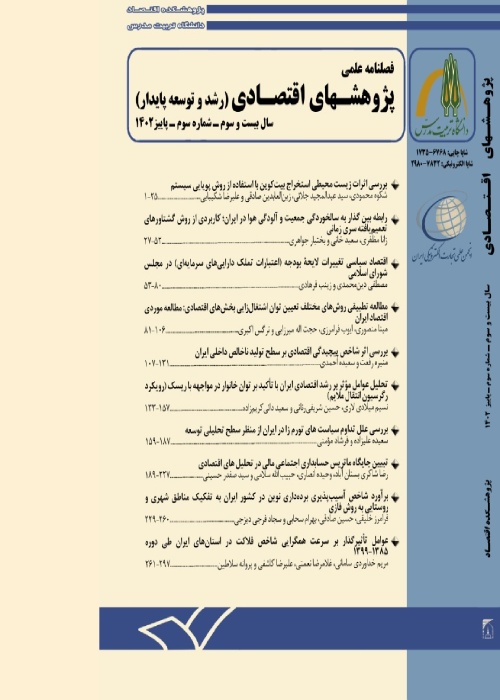Investigating the Impact of Economic Complexity and Renewable Energy Consumption on Environmental Pollution in Developing Countries
Technology provides an opportunity for the economy to move from polluting sources to renewable sources to meet energy needs. Increasing economic complexity means more use of technology and innovation in production and may cause the expansion of effective technological products such as renewable energy. In the past few decades, the share of renewable energy has increased due to a wide range of factors, such as government regulations to promote the use of renewable energy, reduction in the cost of installing renewable energy and increasing production capacity, oil price fluctuations, and the positive effects of renewable energy in reducing emissions. Carbon and innovation processes have increased in the energy sector. Therefore, in this research, the effects of renewable energy consumption and economic complexity as well as their mutual effects on environmental pollution have been investigated using the GMM method in developing countries over the period 2000-2019.
In dynamic models, due to the presence of a lagged dependent variable, OLS or GLS methods cannot be used to estimate the model, because the disturbance components are correlated with the lagged dependent variable, and the estimation results are biased and inconsistent as before. Therefore, to solve this problem, the GMM method proposed by Arellano and Bond (1991) is used. The GMM estimator belongs to the set of instrumental variables’ estimators. In this method, in addition to solve the problem of the correlation of the independent variable with disturbance components, the endogeneity of the variables and the heteroscedasticity of the variances are also removed. It should be noted that this method is applicable when T (number of periods) is smaller than N (number of sections).
The results show that the economic complexity index has a negative and significant effect on carbon dioxide emissions in developing countries. Variables such as trade openness and energy intensity increase carbon dioxide emissions, and the Kuznets curve hypothesis is confirmed for developing countries, and economic complexity leads to an upward movement of the Kuznets curve. Renewable energy consumption has a significant effect on reducing carbon dioxide emissions, and also at higher levels of economic complexity, renewable energy consumption causes a greater reduction in carbon dioxide emissions.
Conclusion and
The need for a more accurate understanding of economic phenomena has prompted economists to review previous theories and present new theories that have a new window to economic development literature. The goal of all countries is to achieve sustainable economic growth and development. Renewable energy technologies are promising, but there is very little information about its role as a limiting factor in reducing environmental pollution, especially in developing countries. Therefore, in this research, the effects of renewable energy consumption and economic complexity as well as their mutual effects on environmental pollution have been investigated using the GMM method in developing countries over the period 2000-2019. The results show that the economic complexity index has a negative and significant effect on the emission of carbon dioxide, so it can be said that for developing countries, moving towards a more knowledge-oriented economy can improve the quality of the environment. The variables of trade openness, energy intensity significantly affect positively CO2 emissions. The EKC hypothesis was confirmed with the positive logarithm of GDP per capita and its negative square coefficient. According to the results of the study, economic complexity in countries under study leads to an upward movement of EKC, which means that as economic complexity increases in developing countries due to increased energy demand, scale effects occur and lead to higher CO2 emissions.
In this study, energy intensity has a positive effect on the increase in carbon dioxide emissions and as a result the increase in environmental pollution in developing countries.
The specific result of this article is the significant effect of renewable energy consumption on the reduction of carbon dioxide emissions in developing countries. At higher levels of economic complexity, renewable energy consumption causes a greater reduction in CO2 emissions. In terms of the role of complexity, it can be argued that in countries under consideration, the share of renewable energy should be significantly increased by using innovation processes in the energy sector. Considering the negative effects of the share of renewable energies on carbon dioxide emissions per capita, it is suggested to define new patterns of energy consumption by relying on renewable energies in development programs and using incentive tools to replace renewable energies instead of fossil fuels to reduce pollution. Developing countries should support knowledge-based industries, increase the import and production of environmentally friendly technologies, and increase the share of renewable energy in their plans to protect the environment. In addition, pricing strategies can be proposed to avoid increased fossil fuel consumption.
- حق عضویت دریافتی صرف حمایت از نشریات عضو و نگهداری، تکمیل و توسعه مگیران میشود.
- پرداخت حق اشتراک و دانلود مقالات اجازه بازنشر آن در سایر رسانههای چاپی و دیجیتال را به کاربر نمیدهد.


